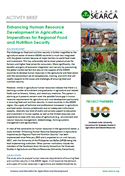Enhancing Human Resource Development in Agriculture: Imperatives for Regional Food and Nutrition Security
Background
 The challenge on food and nutrition security is further magnified as the agriculture sector of several Southeast Asian countries is much less integrated with the global markets because of major barriers to world food trade and investment. This has unfavorably led to lower product prices for farmers and higher food prices for consumers. More significantly, the benefits and gains of economic integration rest not only by overcoming the global market barriers but also on the capacity of the Southeast Asian countries to develop human resources in the agricultural and food sector with the concomitant set of competencies, training, and skills that will readily respond to the issues and challenges of ensuring food and nutrition security.
The challenge on food and nutrition security is further magnified as the agriculture sector of several Southeast Asian countries is much less integrated with the global markets because of major barriers to world food trade and investment. This has unfavorably led to lower product prices for farmers and higher food prices for consumers. More significantly, the benefits and gains of economic integration rest not only by overcoming the global market barriers but also on the capacity of the Southeast Asian countries to develop human resources in the agricultural and food sector with the concomitant set of competencies, training, and skills that will readily respond to the issues and challenges of ensuring food and nutrition security.
However, trends in agricultural human resources indicate that there is a declining number of enrolment and graduation in agriculture and related fields such as forestry, fishery, and veterinary medicine. This pattern is alarming as it presents concern over the possible future gap in human resource requirements for agriculture and rural development particularly in ensuring food and nutrition security. In most countries in the Southeast Asian region, the supply of technical and professional manpower in agriculture and food sector remains problematic due to inadequate institutional capacity, relatively low level of public and private support to education and investment in human capital, as well as the limited resources and experience to cope with new areas of agriculture (e.g., environment and natural resource management, biotechnology, farming systems management, and agribusiness).
In view of the constraints on human resources in the agricultural sector, a study entitled "Enhancing Human Resource Development in Agriculture: Imperatives for Regional Food and Nutrition Security" is being implemented since February 2016 and is expected to run until 31 October 2017 with the University of the Philippines Los Baños (UPLB) as the lead implementing institution. Other partner institutions include the members of the Southeast Asian University Consortium for Graduate Studies in Agriculture and Natural Resources (University Consortium).
Objectives
The study aims to analyze human resource requirements of ensuring food and nutrition security in the ASEAN region. It will examine the demand and supply of human resources in agriculture and related disciplines by investigating the enrolment and graduation rates, including the employability of agriculture graduates in the selected Southeast Asian countries.
Specifically, this study seeks to investigate the employability of graduates both from the demand and supply side in terms of skills, competencies, and qualification requirements by firms at the micro-level, and the economy at the macro-level. Furthermore, in the supply-side, using the same set of variables or characteristics required by firms, this study will analyze the characteristics of students and graduates in terms of socio-economic, demographic, and educational profiles.
Methodology
- Environmental Scanning and Inventory of Agriculture Human Resources
- Describe comprehensively the qualitative and quantitative elements of the current and potential supply of agricultural human resource capacities for food and nutrition security through in-school student survey and tracer studies.
- Examine the factors affecting enrolment and graduation from agriculture and related-discipline with the aid of survey and tracer studies.
- Examine the factors affecting demand for graduates of agriculture and related-degree programs through the conduct of business firm-establishments and employer tracer surveys.
- Using the database gathered, an outlook of agriculture labor market will be described and a forecast of demand-supply of agriculture human resources and skills will be made in relation to national economic and agriculture-specific sector performance.
- An analysis of skill shortages/skill gaps and hard-to-fill jobs/positions will be made.
- Regional workshop(s) will be done with regard to the design and implementation of the survey and tracer studies, discussion of findings, data analysis and forecasting of skills and human resource requirements, and final phase of writing, editing, and publication of the report.
- General and specific policy interventions will be presented based on the analyses made in the previous sections. These will be through a policy brief and publication of book and journal articles.
